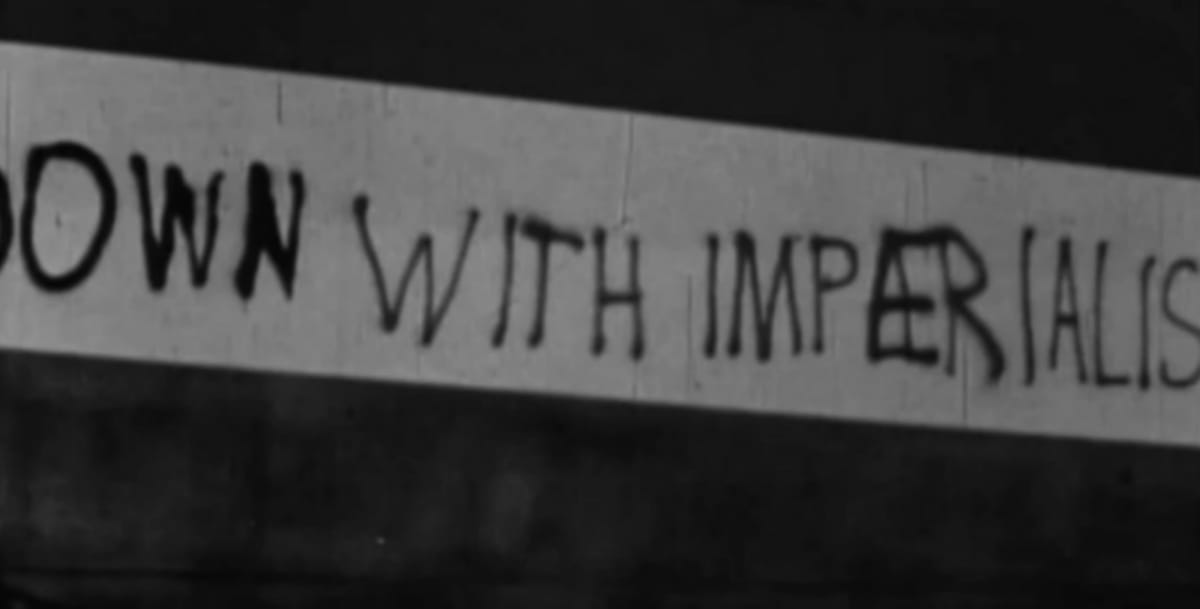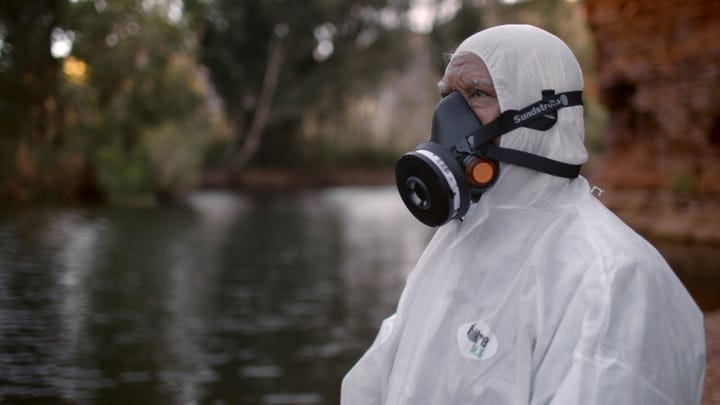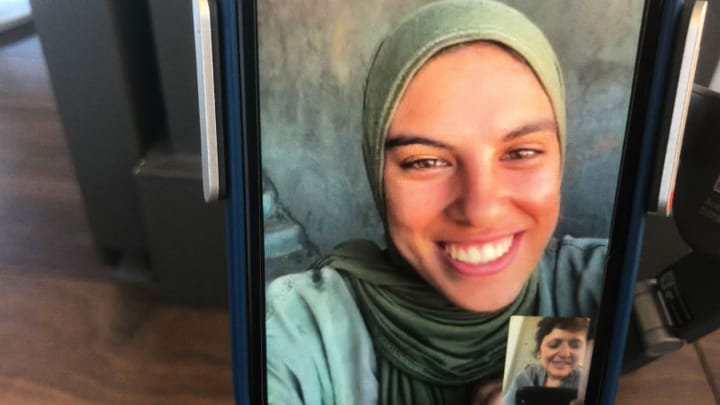'Stars of Orion' by Adam Bahgat (2012)
A. Zayn: This documentary makes an important contribution to the history of the Palestinian struggle.

I don’t know a lot about Japan. What little I do know is a combination of accounts of how powdery Japanese snow is (I don’t ski), stories of father-son visits to onsens (which inevitably revolve around the fact they were both naked), and anything incidental I might have learnt from reading Norwegian Wood (which I didn’t love).
The screening and QandA of the 2012 documentary Stars of Orion: Japanese Martyrs for Palestine, hosted by Tunnel Vision certainly expanded my limited understanding of Japan. I’m sure the existence of Japanese militants fighting with the Popular Front for the Liberation of Palestine (PFLP) would have come as a surprise to even the most rabid Japanophiles.
May Shigenobu, the daughter of the former leader of the communist Japanese Red Army, Fusako Shigenobu, wrote, produced and starred in the film. The documentary tracks Fusako Shigenobu’s immersion into the revolutionary student politics of post-war Japan and her eventual decision to travel with her comrades to Lebanon to fight with the PFLP.
The Japanese-Palestinian relationship at first glance seems bizarre but makes more sense when situated in the internationalist anti-imperialist sentiment of the 1970s. Leftist groups rode on the wave of decolonisation and Cold War rivalries to expand trans-national cooperation and aimed for the lofty goal of revolutionary change. The climax of the documentary is what is referred to as the Lydd (Lod) Airport operation, which saw 3 Red Army members, with the assistance of the PFLP, attack the Israeli airport killing 26 people and injuring 80 more.
Shigenobu does a good job of telling a complex story with clarity, not pushing the form too far (a long-winded samurai metaphor was alluded to at the start but thankfully avoided), and letting those involved, now elderly, recount the events. Interviewees included Palestinian revolutionary icon Leila Khaled and other surviving members of the PFLP and Red Army, the latter of whom had been historically hesitant to speak on camera. The interviewees spoke about those events with a surprising matter-of-factness and betrayed less emotion than I expected. This could be read as silent disappointment in the voices of revolutionaries coming to terms with the gap between what they hoped to achieve and what materialised in their lifetimes.
The film inevitably plays on the cultural contrast of the Japanese-Palestinian relationship. Arabic commentary sits over shots of modern Japan, grainy footage of PFLP fighters singing liberation songs and reading Mao’s little red book are interposed between commentary on the political context of post-war Japan. The most powerful and authentic fusion of the two cultures is May Shigenobu herself. Born to a Japanese mother and Palestinian father, she’s filmed speaking to locals in her mother’s hometown as comfortably as she offers commentary in Arabic while strolling through the Sabra Refugee Camp in Beirut.
Her remarkable ability to hold two seemingly divergent identities came across as the most eloquent expression of a certain idea of Palestine as the epicentre of a global fight against imperialism, a vision which ultimately brought the Red Army and PFLP together. This aspect of the movie was particularly resonant given the reemergence of the global Palestinian solidarity movement.
Although Shigenobu featured heavily in the documentary, she didn’t go into great detail about what must have been an upbringing that was equally fascinating as it was traumatising in the Palestinian refugee camps of Lebanon. As she said in the QandA which followed the screening, the goal of the film was to shine a light on the forgotten story of the Red Army and Palestine. With this in mind, it’s understandable that her focus was not inward-facing.
What did seem like a glaring omission of the documentary was the failure to mention that 17 of the 26 casualties of the attack were Puerto Rican pilgrims visiting Israel. Rather, the current leader of the PFLP vaguely said that a large number of Israelis were killed, especially military and police. This obfuscation (or lie) not only deprived the documentary of the chance to engage in real reflection on any failures or shortcomings of the Red Army-PFLP tactics but betrayed a lack of trust in the audience to make an informed judgment. It was difficult to get over what felt like having the wool pulled over my eyes, especially in light of the way in which much of the western media has, and continues to, obfuscate Israeli violence.
To what extent must Palestinians shoulder the burden of the truthful telling of the past, particularly when they have suffered so greatly under the burden of contorted facts and erased history? Yes, narratives play an important role in galvanising global support for Palestine, but what price should the truth pay in achieving this? The argument for a clear-eyed reading of history is not only a moral imperative owed to both viewers of the film and victims of the Lydd attack. It is also a compelling one because understanding mistakes of the past -- what worked and what didn't work in the one-hundred-year struggle for Palestinian freedom -- is critical for Palestinians themselves.
No doubt this documentary makes an important contribution to the history of the Palestinian struggle, and its inclusions and omissions may offer equally interesting insights for the movement going forward.
If you would like to know more about this moment in history, Workshops 4 Gaza are hosting an online session with historian, Jeremy Randall, on Wednesday 27 August. Details are here.
Fleapit Pick of the Week
The Queer Screen Film Festival is kicking off this Wednesday at Event Cinemas, George St, with Plainclothes (2025)by Carmen Emmi. The program also includes an Australian film and feature directorial debut, From All Sides, by Bina Bhattacharya. Check out the full program here.
Screenings: Thursday 21 AUGUST - Wednesday 27 AUGUST
Cinema Astragale
The Red Inn (Claude Autant-Lara, 1951)
Thursday
Inner West Libraries Film Club
Spring, Summer, Fall, Winter...and Spring (Kim Ki-duk, 2003)
Thursday
Àma Gloria (Marie Amachoukeli, 2023)
Friday
Miya Miya Film Club
A Fairuz Retrospective (SOLD OUT)
Friday
Pink Flamingo Cinema
Rats! (Maxwell Nalevansky & Carl Fry, 2024)
Wednesday
Queer Screen
Plainclothes (Carmen Emmi, 2025)
Wednesday
VHS Fleapit
The Oily Maniac (Meng Hua Ho, 1976)
Tuesday
Riverside Parramatta
Future Council (Damon Gameau, 2024)
Thursday
Hayden Orpheum | selected highlights
My Neighbour Totoro (Hayao Miyazaki, 1988)
Thursday
Princess Mononoke (Hayao Miyazaki, 1997)
Friday, Saturday & Sunday
Chopper (Andrew Dominik, 2000)
Friday
Teenage Mutant Ninja Turtles (Steve Barron, 1990)
35th Anniversary Pizza Party
Saturday
Lawrence of Arabia (David Lean, 1962)
Sunday
Golden Age Cinema | selected highlights
Chopper (Andrew Dominik, 2000)
Thursday & Tuesday
The Castle (Rob Sitch, 1997)
Sunday
The Extraordinary Miss Flower (Iain Forsyth & Jane Pollard, 2024)
Sunday
Midsommar (Ari Aster, 2019)
Wednesday
Ritz Cinemas, Randwick | selected highlights
Together (Michael Shanks, 2025)
Daily
Kangaroo Island (Timothy David Piper, 2025)
Daily
Robert Altman Retrospective (link)
The Player (Robert Altman, 1992)
Thursday
Cult Classics (link)
Chopper (Andrew Dominik, 2000)
Saturday & Monday
Celluloid Film (link)
The Sixth Sense (M. Night Shyamalan, 1999)
Friday
Classic Matinees (link)
The Third Man (Carol Reed, 1949)
Saturday & Monday
Make It Musical (link)
Spice World (John Spiers, 1997)
Sunday & Wednesday
Meet Cute (link)
Jerry Maguire (Cameron Crowe, 1996)
Tuesday
Dendy Newtown | selected highlights
Together (Michael Shanks, 2025)
Daily
Chopper (Andrew Dominik, 2000)
Daily
Princess Mononoke (Hayao Miyazaki, 1997)
Daily
The Director's Cut (link)
Apocalypse Now - Final Cut (Francis Ford Coppola, 1979)
Friday
Cineversaries (link)
Rashomon (Akira Kurosawa, 1950)
Thursday & Saturday
Night Shift (link)
Pumping Iron (George Butler & Robert Fiore, 1977)
Daily
Palace Cinemas | selected highlights
NYTimes Top 10 Films of the 21st Century
In The Mood For Love (Wong Kar-wai, 2000)
Saturday
There Will Be Blood (Paul Thomas Anderson, 2007)
Sunday
Cult Vault (link)
The Thing (John Carpenter, 1982)
Monday
Matinee Memories (link)
King Creole (Michael Curtiz, 1958)
Saturday
Art Gallery of NSW
Alphaville (Jean-Luc Godard, 1965)
Sunday
The Umbrellas of Cherbourg (Jacques Demy, 1964)
Wednesday




Comments ()